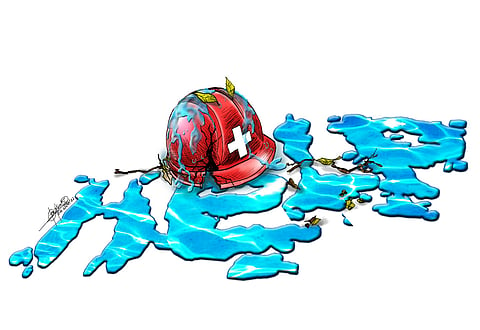
- NEWS
- the EDIT
- COMMENTARY
- BUSINESS
- LIFE
- SHOW
- ACTION
- GLOBAL GOALS
- SNAPS
- DYARYO TIRADA
- MORE

As the National Disaster Risk Reduction and Management Council briefed President Ferdinand Marcos Jr. Monday morning that there was little damage and no casualty from typhoon "Karding," Bulacan local government officials were announcing with heavy hearts the death of five local rescuers earlier reported to have gone missing.
San Miguel Mayor Roderick Tiongson said the five belonged to the Bulacan Provincial Disaster Risk Reduction and Management Office and were responding to cries for help from residents of flood-hit barangays in his town when all contact with them stopped. The five were found to have drowned, according to Tiongson, with pictures of the fatalities making the rounds of social media heart-rending.
Governor Daniel Fernando confirmed the deaths in what should underscore the perils that rescuers face whenever they are called to action to save lives during natural and man-made calamities. Rescuers oftentimes find themselves in need of rescue as disasters like erupting volcanoes and raging typhoons have never been selective in trying to make victims of us all, as long as we are within their claws.
Tiongson narrated that the Bulacan PDRRMO members were deployed at about 4 a.m. to rescue residents in Barangays Tigpalas and Samias when floodwater in those areas reached over six feet. In life, the five, along with all of the unsung rescuers across the nation, are much appreciated by the besieged that they aid; in death, they are transformed into modern-day heroes the nation looks up to for selfless inspiration on gambling with their own lives so others may live.
Disaster damage estimates and casualty counts have always been an hour-by-hour affair; thus, it was understandable that the passing of the five rescuers was yet to make the national tally when the President was briefed. As this sees print, we would have gotten a clearer sense of how devastating "Karding" has been or, as President Marcos said, how "lucky" we had been in sustaining minimal damage and casualties from a howler that reached Signal No. 5.
Nonetheless, the heroes of Bulacan have families whom the government must now take care of. Maybe both the national and local governments can cobble up something like the P1 million that had been given as a lump sum to the respective families of each health worker who died from exposure to Covid-19. Like the star-crossed health workers killed by Covid, the Bulacan rescuers gave up their own lives answering the call of duty.
While money cannot take the place of lost loved ones, it — along with other support like scholarships for those children left behind — can help the families of the deceased personnel cope somehow. Likewise, this tragedy should spur the government, especially lawmakers, to concretize or codify into law commensurate benefits for first responders and rescuers during calamities.
First responders would have more peace of mind if they know that they or their families have benefits like medical care, disability pay and death remuneration in the event that they sustain injuries or worse die from doing their jobs. It's true that Republic Act 10121, or the Philippine Disaster Risk Reduction and Management Act of 2010, have devolved to local governments the responsibility to serve as first responders to natural and man-made calamities.
Likewise, RA 7160, or the Local Government Code of 1991, mandates LGUs to undertake rescue operations, provide immediate relief assistance and set up and manage evacuation centers at the first instance of disaster occurrence.
Notwithstanding RAs 10121 and 7160, lawmakers should consider crafting a law that would put in place a host of benefits for rescuers and first responders that is national in application and funding, similar to the benefits enjoyed by members of the uniformed services like the Philippine National Police and the Armed Forces of the Philippines.
While many local government units are financially capable of providing benefits commensurate to the risks faced by calamity first responders, nothing would beat putting the resources of the State itself into providing safety nets for our rescuers.
